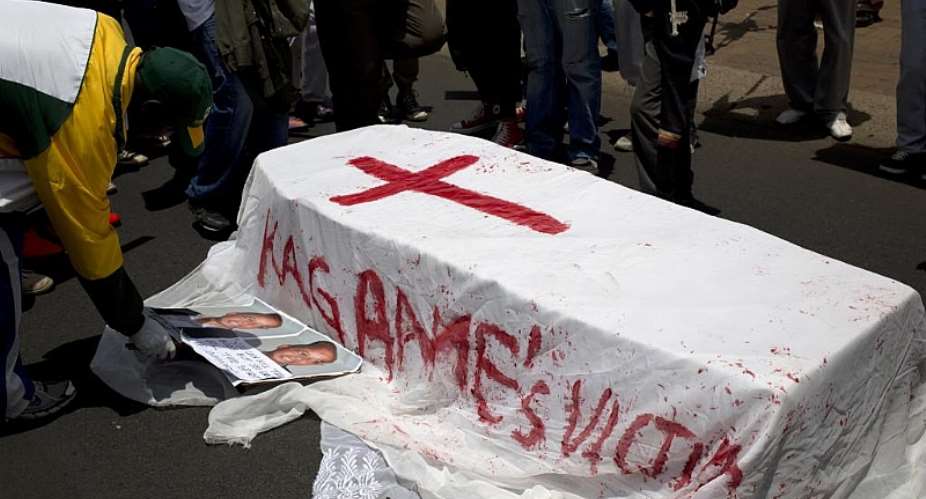The suspects in the murder of ex-Rwandan spy Chief Patrick Karegeya could be brought to justice. A South African judge on Thursday ordered the case to be handed over to prosecutors who will consider whether to issue arrest warrants. The case threatens to embarrass President Paul Kagame, accused of being "directly linked" to the alleged assassins.
Patrick Karegeya, a former Rwandan spy Chief and top aide to President Paul Kagame, was strangled on New Year's Eve in 2013 after being invited to a glitzy five-star hotel in Johannesburg.
His family and opposition colleagues have always blamed the murder on Rwandan intelligence acting on orders from Kagame – a claim he has vehemently denied.
Up until now, prosecutors in South Africa have treated Karegeya's murder with caution, not least because of the possible diplomatic fallout it threatens with Rwanda.
One police officer in charge of the investigation told the court on Thursday that the killers were "well-known."
"Our investigations reveal that the identified suspects immediately fled South Africa after committing the crime," lieutenant-colonel Kwena Motlhamme told AFP.
Direct links to Kigali
The suspects are still in Rwanda today, which makes it “very difficult” to trace them, he said.
According to police investigators, their "direct links" to the government of President Paul Kagame makes issuing arrest warrants sensitive.
That would require official requests for their extradition, which could further strain relations between Kigali and Pretoria.
The Rwandan embassy was already closed over the scandal in 2014, shortly after 53-year-old Karegeya was found dead in the Michelango hotel which led to ambassadors from both countries being expelled.
Even so, Karegeya's family is hoping against all hope that the government of South Africa can bring about justice.
Justice now
"Definitely what the family needs, or the Rwandans and the human rights activists need, or even what the South African government needs, is to see justice done," insists Kennedy Gihana, one of the family's lawyers.
Karegeya was murdered in a well-planned attack, which has been compared to the killing of Saudi journalist Jamal Khashoggi in the Saudi consulate in Istanbul last October.
"People must not act with impunity. We want the people who killed Patrick Karegeya to be accountable, and to pay for the crimes they committed. So that's what the family needs, they need justice; they need closure," Gihana told RFI.
"There was overwhelming evidence connecting the Rwandan embassy to the people who came here and killed Patrick, so that was not acceptable," says Frank Ntwali, who represents Rwandan refugees in South Africa.
"We know that, as refugees living in South Africa, we've been hunted and tracked down by the agents of Kigali sent down to South Africa, as they've done in other countries to kill so-called dissidents," Ntwali told RFI.
"Haven for killers"
Karegeya had been a close friend of President Paul Kagame until they fell out. He fled Kigali in 2008, setting up the the Rwandan National Congress opposition party in exile.
For rights groups, his demise matches a brazen pattern to silence Rwandan dissidents abroad. In a 2014 report, Human Rights Watch detailed 13 cases of former politicians from the ruling Rwandan Patriot Front, as well as military figures, intelligence agents and journalists who had fled Rwanda and been assassinated, kidnapped or attacked in Kenya, Uganda, South Africa or the UK.
"If the public prosecutor does not pursue this case, it will mean that South Africa has become a haven for killers," Gerrie Nel, another lawyer for Karegeya's family told AFP.
Human rights vs recovery
Although there is no extradition treaty between Rwanda and South Africa, Karegeya's family members and lawyers want the South African authorities to issue arrest warrants for the suspects, allowing them to be detained if they travel outside Rwanda. It's now up to prosecutors to decide on whether to do so.
The case has reignited concerns about Rwanda's human rights record and shed light on the paradox between the country's impressive recovery since the 1994 genocide and its history of suppressing political freedom.
Contacted by RFI, officials within the Rwandan government abstained from commenting on the Karegeya case, saying it was an internal matter for South Africa.





 Avoid pre-registered SIMs, buyer and seller liable for prosecution – Ursula Owus...
Avoid pre-registered SIMs, buyer and seller liable for prosecution – Ursula Owus...
 Election 2024: Mahama has nothing new to offer Ghanaians, Bawumia is the future ...
Election 2024: Mahama has nothing new to offer Ghanaians, Bawumia is the future ...
 OSP files fresh charges against ex- PPA Boss
OSP files fresh charges against ex- PPA Boss
 Withdraw unreasonable GH¢5.8m fine against former board members – ECG tells PURC
Withdraw unreasonable GH¢5.8m fine against former board members – ECG tells PURC
 Akroma mine attack: Over 20 armed robbers injure workers, steal gold at Esaase
Akroma mine attack: Over 20 armed robbers injure workers, steal gold at Esaase
 Those who understand me have embraced hope for the future — Cheddar
Those who understand me have embraced hope for the future — Cheddar
 Ghana will make maiden voyage into space should Bawumia become President — Chair...
Ghana will make maiden voyage into space should Bawumia become President — Chair...
 Train crash: Despite the sabotage, we shall not be deterred and will persevere —...
Train crash: Despite the sabotage, we shall not be deterred and will persevere —...
 Tema-Mpakadan railway project a perversion of the original viable concept design...
Tema-Mpakadan railway project a perversion of the original viable concept design...
 Train crash: Elsewhere, everyone involved in the test will either be fired or re...
Train crash: Elsewhere, everyone involved in the test will either be fired or re...
